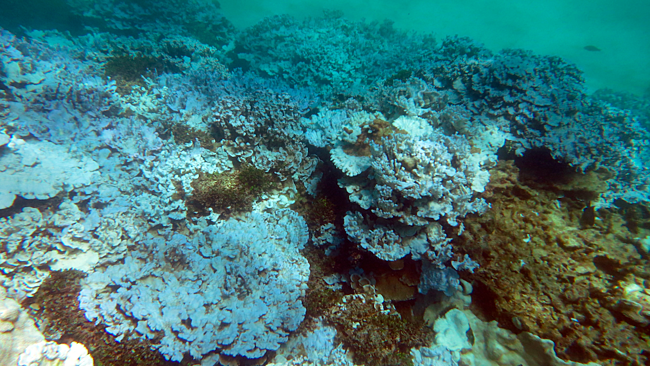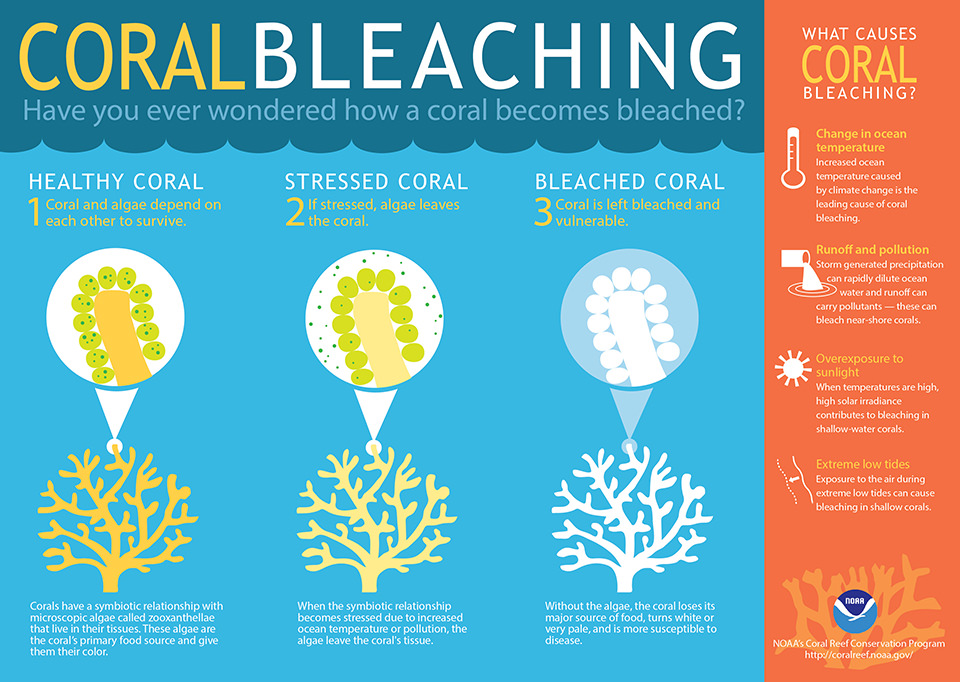Could “Super Coral” save Coral Reefs from Climate Change and Lethal Bleaching?
Coral bleaching is affecting reefs worldwide as ocean temperatures rise. In August 2014, NOAA researchers documented the extensive damage to this reef off of Lisianski Island in Hawaii. Photo Credit/NOAA
Greetings! In some of my past blogs, I’ve been talking about climate change and ocean acidification. And in particular, how increasing amounts of carbon dioxide are killing coral reefs around the world. Well there may be some wonderful news coming out of the University of Hawaii because researchers there are developing a game plan to reverse this serious issue of dying coral.
What is Coral Bleaching?
When the ocean water becomes too warm, coral expels the algae living within the coral’s tissues. It is actually algae which gives coral reefs their extraordinary colors. And when the coral ejects the algae, this causes the coral to turn completely white. This phenomenon is called coral bleaching.
Photo Credit/NOAA
According to the National Oceanic and Atmospheric Administration [NOAA], “In 2005, the U.S. lost half of its coral reefs in the Caribbean in one year due to a massive bleaching event. The warm waters centered around the northern Antilles near the Virgin Islands and Puerto Rico expanded southward. Comparison of satellite data from the previous 20 years confirmed that thermal stress from the 2005 event was greater than the previous 20 years combined. Without algae, the coral lacks a major source of food and becomes more susceptible to disease. While corals can recover from mild bleaching, severe or long-term bleaching is often lethal.”
Then in October of 2015, NOAA explained they had, “…the third global coral bleaching event ever on record, as stressful conditions expanded to the Caribbean, threatening reefs in Haiti, the Dominican Republic, Puerto Rico and the U.S. Virgin Islands southward into the Leeward and Windward islands.” Mark Eakin, NOAA’s Coral Reef Watch Coordinator, said in a statement, “The coral bleaching and disease, brought on by climate change and coupled with events like the current El Niño, are the largest and most pervasive threats to coral reefs around the world.”
To fight against this international loss of coral reefs, University of Hawaii researchers, supported by Microsoft Co-founder Paul G. Allen’s Vulcan Inc., are now identifying corals that are not affected by warmer ocean water. These resilient strains – are nicknamed “super corals” by the researchers.
Researcher and Co-grantee Ruth D. Gates from the University of Hawaii at Manoa said, “Not all corals are created equal. We will capitalize on those corals that already show a stronger ability to withstand the changing ocean environment and their capacity to pass this resilience along to new generations.”
The University of Hawaii researchers have a five-year grant period and they hope to create a bank of resistant coral and locate it on a damaged and bleached reef. The researchers’ goal is to have these new super corals reproduce with existing corals enhancing the reef’s overall resiliency. Dune Ives, Senior Director of Philanthropy at Vulcan Inc., said, “If coral reefs continue to decline due to warmer, more acidic ocean water, marine ecosystems will forever be altered with ripple effects that we don’t yet fully comprehend.”
As updates from this research project are posted, I’ll talk about them in future blogs.
If you are in Florida and you see a sick or injured manatee, please call the Florida Fish and Wildlife Conservation Commission at: 1-888-404-FWCC. They are the folks who are responsible for rescuing us in Florida.
Here’s the Save the Manatee Club link to learn more about us manatees …
Here’s a cool link for you to learn more about how we’re rescued and brought into rehabilitation …
~ Kobee Manatee
Related Posts
“Seagrass Can Store Carbon for Centuries, Millennia” – Dr. Oscar Serrano, (February 4, 2016)
UNESCO – Its Paramount Role in Ocean Acidification Awareness! (January 8, 2016)
Discover Belize and its Great Barrier Reef System, (December 30, 2015)
Catastrophic Effects of Increasing Ocean Acidification, (December 18, 2015)

